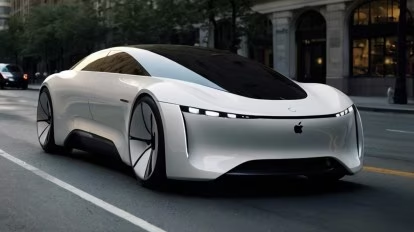
Introduction
apple car has always been a company synonymous with innovation. From the groundbreaking iPhone to the sleek MacBook lineup, Apple consistently pushes the boundaries of technology. However, the company is now steering into uncharted territory: the automotive industry. Rumors of the so-called “Apple Car” have been circulating for years, and while Apple has remained tight-lipped about the project, leaks and industry speculation paint an intriguing picture of what could be one of the most revolutionary products in automotive history.
In this article, we’ll explore what we know about the Apple Car, the challenges Apple faces, and why this project could redefine the future of transportation.
The Vision: What Is the Apple Car?
Apple is reportedly working on an autonomous electric vehicle (EV), designed to compete with industry giants like Tesla and established automotive brands transitioning to EVs. This ambitious project, often referred to as “Project Titan,” started as early as 2014. Initially, there were conflicting reports about whether Apple was designing an actual apple car or simply focusing on autonomous driving software. Over time, it’s become evident that Apple aims to deliver a fully integrated vehicle, combining its software expertise with groundbreaking hardware design.
Key Features We Might See
- Autonomous Driving
The Apple Car is rumored to prioritize full self-driving capabilities. Apple has been developing advanced sensors, including LiDAR, to create a robust autonomous system. Unlike other vehicles that offer partial automation, the Apple Car could aim for Level 4 or even Level 5 autonomy, allowing for completely hands-free driving in most conditions. - Electric Powertrain
As the automotive industry shifts toward sustainable energy, Apple’s car will undoubtedly be electric. The company is likely to leverage cutting-edge battery technology, potentially offering improved range, faster charging, and better efficiency than competitors. - Seamless Integration with Apple Ecosystem
One of Apple’s key strengths lies in its ecosystem. Imagine an EV where you can unlock the doors with your Apple Watch, have Siri control climate settings, or seamlessly sync your Apple Music and Maps. The Apple Car could redefine the user experience by integrating all Apple devices seamlessly.
Challenges Apple Faces

While the idea of an Apple Car is exciting, venturing into the automotive industry is no small feat. Apple, despite its tech dominance, will face numerous challenges in bringing this vision to life.
Entering a Saturated Market
The EV market is already crowded, with Tesla leading the way and traditional automakers like Ford, GM, and Volkswagen rapidly electrifying their lineups. Apple will need to differentiate itself significantly to carve out a space in this competitive market. Relying solely on the brand’s prestige may not be enough when consumers weigh factors like cost, range, and performance.
Supply Chain and Manufacturing
Building a apple car is vastly different from producing smartphones. Apple’s products are known for their precision and premium quality, but achieving this in automotive manufacturing presents unique hurdles. Apple will likely rely on partnerships with established automakers or contract manufacturers to produce its cars, which could complicate quality control and supply chain logistics.
Regulatory Hurdles
Autonomous vehicles are subject to stringent regulations that vary by country and region. Apple will need to navigate this complex landscape while ensuring its self-driving system meets safety standards. Delays in obtaining necessary certifications could push back the launch timeline.
What Sets the Apple Car Apart?
Despite the challenges, Apple has several advantages that could help it redefine the automotive space. The company’s history of entering crowded markets and emerging as a leader cannot be ignored.
Innovation Through Design
Apple is known for its design philosophy, blending functionality with aesthetics. The Apple Car is expected to showcase a futuristic yet minimalist design. Early patents suggest unique features like fully glass roofs, customizable interiors, and seats that swivel to foster a lounge-like atmosphere. If Apple applies its legendary design sensibility to the apple car, it could stand out as a status symbol.
Cutting-Edge Technology
Apple has been heavily investing in artificial intelligence, machine learning, and augmented reality—technologies that could all play a role in the Apple apple car. For instance, augmented reality displays could replace traditional dashboards, providing drivers and passengers with an intuitive, interactive experience.
Ecosystem Synergy
Apple has always excelled in creating a seamless ecosystem across its devices, and the car would likely extend this ecosystem. Features like CarPlay could evolve into a full-fledged operating system tailored for vehicles. Imagine using your iPhone as the car’s key or having FaceTime meetings on the go with the car’s built-in high-quality audio and video systems.
The Rumored Timeline
The timeline for the Apple Car’s release remains murky. Initial reports suggested a launch as early as 2025, but delays are highly likely given the complexity of the project. Apple is known for taking its time to perfect products before releasing them, so it wouldn’t be surprising if we see the car closer to 2030.
Partnerships with companies like Hyundai, Kia, or even Japanese automakers have been rumored, but no concrete deals have been announced. Apple’s approach seems to involve developing much of the core technology in-house before relying on external partners for production.
The Impact on the Automotive Industry
If successful, the Apple Car could significantly disrupt the automotive industry. Just as the iPhone redefined smartphones, the Apple Car has the potential to revolutionize how we think about personal transportation.
Pushing Competitors to Innovate
Tesla has long been considered the benchmark for EV innovation, but Apple’s entry could push competitors to accelerate their development timelines and improve their products. Established automakers may need to rethink their strategies to compete with Apple’s tech-focused approach.
Changing Consumer Expectations
Apple’s focus on user experience could raise the bar for the entire industry. From intuitive interfaces to seamless connectivity, consumers may start expecting these features as standard in all vehicles, forcing automakers to adopt similar innovations.
A Step Toward Autonomous Futures
The Apple Car could also accelerate the adoption of autonomous driving technologies. If Apple succeeds in delivering a reliable self-driving car, it could pave the way for widespread acceptance and usage of autonomous vehicles, reshaping urban planning and commuting.
Conclusion
The Apple Car represents more than just a new product; it symbolizes Apple’s ambition to reshape yet another industry. While significant challenges lie ahead, Apple’s history of innovation and focus on user experience make the prospect of the Apple Car incredibly exciting. Whether it’s redefining design, pushing the boundaries of autonomous technology, or seamlessly integrating into our digital lives, the Apple Car could be a game-changer for both the tech and automotive industries.
While we wait for official announcements, one thing is clear: Apple’s venture into the automotive space is poised to make waves, and the journey promises to be as fascinating as the destination.



